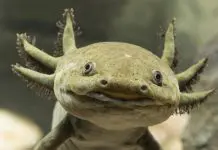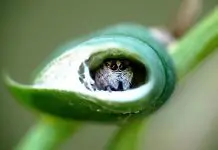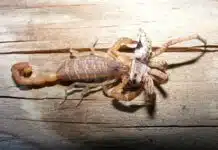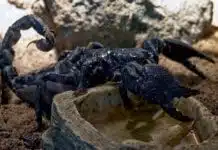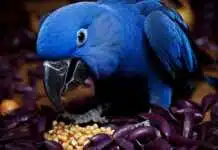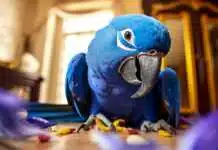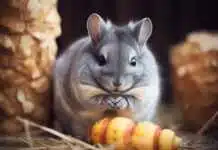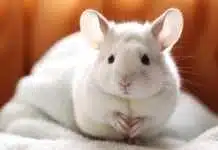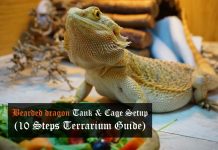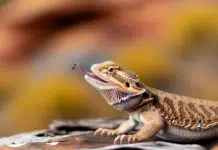Brief Overview of Degu as a Pet
Degus are adorable, active, and intelligent rodents that make popular pets among many animal lovers. Native to Chile, these social creatures are known for their friendly and inquisitive personalities.
They have become increasingly popular as pets due to their unique qualities such as playful temperament, longevity (up to 8 years), and the ability to form strong bonds with their owners. However, before adopting a degu, it is important to do some research about the care requirements needed.
Degus have specific needs when it comes to diet, exercise, social interaction, and habitat. In particular- providing a suitable cage is essential for ensuring that your degus live happy and healthy lives.
Importance of Providing a Suitable Cage for Degus
Degus are very active animals that require lots of space to play and explore. They love climbing on various surfaces and can easily injure themselves if the cage is not large enough or if there are not enough hiding places.
Therefore, providing an adequate-sized cage is crucial for ensuring their safety. Additionally, providing an appropriate cage environment will encourage natural behaviors such as burrowing in bedding material or gnawing on toys which will help keep them mentally stimulated and physically fit.
Keeping your degu’s home clean and hygienic is critical for preventing health issues such as respiratory infections or digestive disorders. Now that we understand the importance of providing suitable housing for our pet degus let’s take a look at what factors need considering when choosing the right cage size and materials – our next section!
Cage Size and Material
Ideal Cage Size for Degus
Degus are very active animals that require a lot of space to play, climb, and explore. Therefore, it’s important to provide them with a cage that is large enough to accommodate their needs.
As a general rule of thumb, the minimum recommended cage size for two degus is 24 x 18 x 24 inches. However, if you can afford it and have enough space in your home, it’s best to go bigger.
A larger cage will not only make your degus happier but also healthier. It will give them more room to exercise and reduce the risk of obesity or other health problems related to lack of movement.
Ideally, you should aim for a cage that has multiple levels or platforms connected by ramps or ladders. This will add an extra dimension to their play area and provide more opportunities for exploration.
Recommended Materials for the Cage
When it comes to choosing the right materials for your degu’s cage, there are several factors you should consider. Firstly, you want something that is durable and easy to clean.
Degus can be messy animals that love chewing on things, so you need a material that can withstand their activity without breaking down quickly. Wire cages are a common choice because they allow good ventilation and visibility while also being sturdy enough to handle degu antics.
However, make sure the wire spacing isn’t too wide (no more than 1/2 inch) as degus can easily slip through wider gaps. Another option is an aquarium-style cage made of glass or plastic.
These cages offer better insulation against noise and temperature changes but may require extra ventilation fans or air holes on top. Regardless of which material you choose, make sure there aren’t any sharp edges or corners inside the cage as these can injure your pets.
You can cover sharp edges with PVC pipes or cardboard tubes to make them safe for your degus. In addition to the cage itself, you’ll need to provide a solid floor covering that is comfortable for your degus to walk on.
Avoid using wire mesh or other abrasive materials that can hurt their feet. Good options include fleece, flannel, or towels that you can change regularly.
Cage Setup and Accessories
The Importance of Providing Hiding Places and Toys
Degus need a comfortable and stimulating environment in which to live. One aspect of this is providing them with hiding places.
These can be anything from small wooden houses to tunnels made out of PVC or cardboard tubes. Degus are naturally curious animals, so they will enjoy exploring these types of structures.
Providing toys is also essential for keeping degus active and entertained. Some great options include exercise wheels, chew toys, and tunnels made from natural materials like wood or hay.
Be sure to choose toys that are safe for degus to play with – avoid plastic items that could break off or be ingested. Another important consideration when setting up your degu’s cage is the placement of the accessories.
Make sure there is enough room for your degu to move around comfortably without knocking over any items. It’s also a good idea to rotate the toys in their enclosure periodically so they don’t become bored.
Recommended Accessories such as Exercise Wheels, Tunnels, and Chew Toys
Exercise wheels are an excellent accessory for degus because they allow them to get some much-needed physical activity while inside their cage. Make sure you choose a wheel that is large enough for your degu’s size so they can run without any problems. Tunnels provide another fun way for your degu to explore their environment while also giving them a place where they can hide away when feeling anxious or stressed.
When choosing tunnels, make sure you select ones that are sturdy enough not to collapse when your pet uses them. Chew toys are essential because they help keep your pet’s teeth healthy by providing something safe for them to gnaw on besides their cage bars.
Wooden blocks or sticks made from natural materials like untreated pine or apple branches make great options. In addition to these recommended accessories, you can also provide your degu with a hammock for relaxation, a climbing structure for exercise, or even a sand bath for cleaning their fur.
By providing plenty of hiding places and stimulating toys, you can help keep your degu happy and healthy while they live in their cage. Just remember to choose items that are safe for them to use and make sure there is enough space in the enclosure for everything without overcrowding.
Bedding and Litter
As an owner, it is essential to provide your degu with comfortable bedding that is safe for them. There are several types of bedding materials that are suitable for degus, and choosing the right one can make a big difference in your pet’s health and happiness.
Types of Bedding Materials for Degus
Pine or cedar wood shavings were once popular choices for degu bedding, but they have since been found to be harmful to the respiratory system. Instead, opt for paper-based beddings such as shredded paper, recycled newspaper pellets, or aspen shavings. These beddings are more absorbent than traditional wood shavings, which can help prevent ammonia build-up in the cage.
Paper-based beddings are also dust-free and softer on your pet’s feet than other types of bedding material. As an added bonus, they are environmentally friendly because most brands use recycled materials.
Recommended Litter Options
Degus tend to choose specific areas in their cage as their designated toilet area. It is important to provide litter boxes filled with safe litter options specially designed for small animals such as Carefresh or Kaytee Clean & Cozy Small Pet Bedding.
Avoid using clumping litter or clay-based litter intended for cats because these can be dangerous if ingested by your degu. It is essential to clean the litter box daily and replace all soiled litter weekly to reduce odors and maintain hygiene in the cage.
A deep cleaning of the entire cage should be done every two weeks. Providing safe bedding material and appropriate litter box options helps keep your pet healthy and happy while eliminating offensive smells from their environment.
Cleaning and Maintenance
Frequency of cleaning the cage
Degus are active animals and can make a mess in their cages quite easily. A dirty cage can lead to health problems such as respiratory infections or skin irritations.
Therefore, it is essential to clean their habitat regularly. The recommended frequency for cleaning a degu cage is once every week.
However, if you notice that your pet has soiled the cage more than usual or there are any signs of illness, it would be best to clean the cage more often. It is important to remove all debris and waste from the cage during cleaning.
You should also disinfect any toys or accessories that are inside the habitat. Before putting everything back together, let the cage dry completely to prevent any mold growth.
Tips on how to maintain the cage cleanliness
In addition to regular cleaning, there are some steps you can take to keep your degu’s living space clean between cleanings. Firstly, spot-clean daily by removing any soiled bedding or droppings as soon as you notice them. This will help maintain a healthy environment for your pet and reduce odor.
Secondly, use high-quality bedding material that absorbs moisture well because this will prevent urine from sticking to the bottom of the enclosure and causing bacteria growth. Thirdly, provide your pet with chew toys made specifically for degus because they have teeth that grow continuously throughout their lives; hence giving them something safe and appropriate to gnaw on will keep them occupied while preventing overgrown teeth problems.
Consider placing a litter box in one corner of the enclosure as it will encourage your pet to eliminate their waste in one area rather than scattering it around everywhere else in their habitat. This way, you will not only reduce odors but also save time while spot-cleaning daily.
Maintaining a clean environment for your degus is critical for their health and happiness. Cleaning your pet’s cage at least once a week will keep the environment healthy and prevent illnesses.
Furthermore, spot-cleaning and providing appropriate chew toys and litter boxes will help maintain cleanliness between cleanings. With these tips, you can ensure that your degu has a comfortable, safe living space while also making it easier to care for them in the long run.
Temperature and Humidity Control
Ideal temperature range for degus
Degus are native to the cool, dry climate of Chile, so they are naturally adapted to lower temperatures. The ideal temperature range for degus is between 60 and 75 degrees Fahrenheit (15-24 degrees Celsius).
It is important to avoid extreme temperatures that can make your pets uncomfortable or even cause health problems. When it comes to temperature control, it’s important to keep the cage away from direct sunlight or drafts.
Placing the cage near a window can be tempting as degus love natural light, but it’s important to ensure there is no direct sunlight on the cage during hot summer days. A room with air conditioning or a fan can be helpful in regulating the temperature, but be careful not to have it blowing directly on your degus.
If you live in an area with cold winters, you may need to provide additional heat sources for your degus. Ceramic heaters or under-tank heating pads (external use only) can help maintain a comfortable living environment without drying out their habitat.
Tips on how to regulate humidity levels in the cage
As we mentioned earlier, degus come from a dry climate and they are not adapted to high humidity levels. Excessive humidity can lead to respiratory issues and other health problems in pet degus. Ideally, you should aim for a relative humidity level between 40% and 60%.
To regulate humidity levels in the cage, you should use an absorbent bedding that will wick moisture away from their living space and keep it dry inside their habitat. Aspen shavings or paper-based bedding such as CareFRESH Ultra paper bedding are ideal options.
Another way of regulating humidity levels is by providing good ventilation throughout the cage – this will help keep air flowing inside while reducing overall moisture content. Make sure the cage is not placed in a damp or non-ventilated area, as this can contribute to higher humidity levels.
If you live in a humid area, an air conditioner or dehumidifier can be helpful in regulating both temperature and humidity levels inside your home. By keeping your degu’s cage within the recommended temperature and humidity range, you’ll help ensure they stay happy and healthy for years to come.
Diet and Nutrition
The Ideal Diet Plan for Degus
Degus are herbivores, which means they primarily eat plants. Their ideal diet should consist of hay, fresh vegetables, fruits, and pellets specifically formulated for degus.
Hay should make up 75% of their diet and should be available at all times. Timothy hay is the best option as it is low in calcium and high in fiber.
The remaining 25% of their diet should be made up of fresh vegetables such as leafy greens, carrots, broccoli, bell peppers, and squash. Fruits such as apples and bananas can also be given in small amounts for an occasional treat.
Pellets specially formulated for degus can be given in moderation but should not make up the majority of their diet. Make sure to choose pellets that are free from added sugars or other harmful additives.
Importance of Providing Fresh Water
Water is essential for all living beings including degus. It is important to provide your pet with fresh water every day. A water bottle with a sipper tube attached to the cage is a convenient way to provide water.
Make sure to clean the water bottle regularly to prevent bacteria growth. If you notice any discoloration or odor coming from the water bottle or if your pet isn’t drinking as much water as usual, it’s time to change it.
In addition to providing fresh water daily, make sure the water source you’re using is safe for your pet’s health. Avoid giving tap water that may contain harmful minerals or chemicals that can harm your pet’s health over time.
Keep an eye on how much water your degu drinks each day. If you notice any changes in drinking behavior such as increased thirst or reduced urine output over multiple days it could signal an underlying health problem that requires a visit to the vet.
A balanced diet and access to fresh water are essential for the health of your degu. Make sure to provide a variety of hay, fresh vegetables, and fruit in moderation while avoiding sugary treats and foods that may be harmful to your pet.
Additionally, change the water regularly and ensure it’s safe for consumption. By following these guidelines, you can ensure your degu is getting all the necessary nutrients it needs to thrive.
Common Health Issues in Degus
Overview of common health problems in degus
Degus are generally hardy animals and can live up to 8 years when provided with proper care. However, degus are prone to some health issues that every pet owner should be aware of.
One of the most common health problems in degus is dental issues. As rodents, their teeth grow continuously throughout their life.
However, this can lead to overgrowth and malocclusion if they do not wear down naturally or if the diet does not provide enough opportunities for grinding teeth down. This can cause pain, difficulty eating, and even abscesses if left untreated.
Another issue that degu owners should be aware of is skin problems such as fungal infections and mites. These conditions are generally caused by unclean living conditions and lack of proper hygiene practices.
Symptoms include scratching, hair loss, and skin lesions. Respiratory infections also commonly affect degus especially when they live with other animals like guinea pigs or rabbits that may carry respiratory illnesses that degu’s immune systems cannot fight off easily.
Symptoms include wheezing, sneezing, discharge from the nose or eyes. In addition to these issues mentioned above, gastrointestinal problems are also relatively common in degus due to their sensitive digestive systems where any change in diet or hygiene can cause diarrhea or constipation leading to dehydration.
but equally important is Cancer which has been seen more frequently now than ever before in domesticated Degus particularly the females between 2-5 years old. As a responsible pet owner it’s important to keep an eye on your animal’s overall well-being; If you detect any signs of sickness take your pet for a checkup right away as early detection allows for better treatment outcomes for many ailments that afflict pets like Degus!
Conclusion: Recap on why a proper degu cage is essential
Providing a suitable cage for your degus is crucial to their health and well-being. As social and active animals, degus require a spacious living environment that allows them to move around freely, play, and explore. A proper cage will not only prevent behavioral problems but will also minimize the risk of serious health issues such as obesity, dental problems, and respiratory infections.
When selecting a cage for your degus, it’s important to consider the size and material of the cage. Degus need plenty of space to run around, climb and play.
A minimum size requirement of 24 x 18 x 24 inches should be followed when purchasing or building a degu cage. Additionally, the ideal materials for the cage are those that are sturdy enough to withstand gnawing such as metal or chew-resistant plastics.
In addition to providing ample space for your furry friends to roam around in, adding accessories inside their cages can help keep them entertained and mentally stimulated. Degus love tunnels they can burrow in and hideouts where they can sleep during the day when they are most active at night time.
Bedding materials should be chosen carefully since some bedding types can cause respiratory problems in these small animals if not selected correctly. Hay-based products like hay itself or straw make an excellent natural litter choice if you want something that absorbs moisture well while still being biodegradable.
but equally important is having a suitable diet plan in place for your little furry friend since this plays an important role in keeping them happy & healthy! Feeding fresh fruits&vegetables that supply essential vitamins together with proper pellet feeds provide balanced nutrition making sure they stay healthy with beautiful fur coats!
everything discussed above we have seen how providing adequate housing conditions including enough space & mental stimulation help maintain physical & mental well-being of our little pets. By taking into account their basic needs, we can ensure that they live full and happy lives!

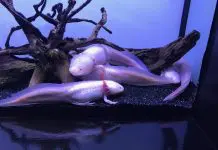

![Sick Axolotl, Fungus, Stress Symptoms [Axolotl Illness Guide 2025] Axolotl fungus](https://exopetguides.com/wp-content/uploads/2018/06/axolotl-218x150.jpg.webp)
